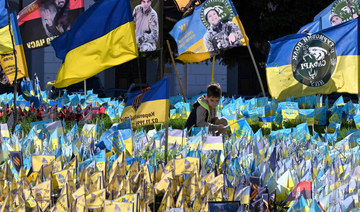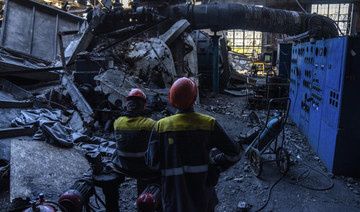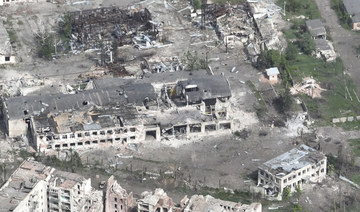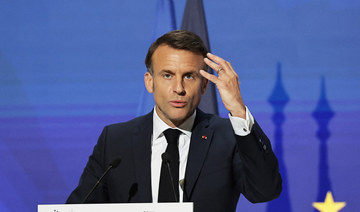HONG KONG: Hong Kong police on Saturday banned a major demonstration against China’s planned national security law for the city which critics fear would smother the financial hub’s treasured freedoms, organizers said.
The Civil Human Rights Front (CHRF) said the force had rejected its applications for rallies on July 1, the 23rd anniversary of the former British colony’s handover to China.
Police cited a risk of violence and said the gatherings and march would “pose a severe threat to public health” due to the COVID-19 pandemic.
The pro-democracy group CHRF, which was responsible for some of last year’s unprecedented million-people demonstrations, said they would appeal the decision.
The semi-autonomous city has been convulsed by a year of huge and often violent rallies that began with an eventually aborted criminal extradition bill but morphed into a popular call for democracy and police accountability.
In May, Beijing announced a draft national security law — which will bypass Hong Kong’s legislature — to tackle “terrorism” and “separatism” in a restless city it now regards as a direct national security threat.
The law would enforce punishment for subversion and other offenses in Hong Kong, but critics see it as potential knock-out blow for freedoms and autonomy enjoyed by the city.
US President Donald Trump’s administration said Friday it was restricting visas for a number of Chinese officials for infringing on the autonomy of Hong Kong, as Congress seeks tougher sanctions.
The Chinese embassy in Washington said “no one has any legal grounds or right to make irresponsible comments on Hong Kong affairs.”
EU also warned China it would face “very negative consequences” if it pressed ahead with the new law.
The law is expected to be voted on during a National People’s Congress Standing Committee meeting to be held from Sunday to Tuesday.
Hong Kong police ban major security law protest
https://arab.news/9xuy3
Hong Kong police ban major security law protest

- Gatherings and march would ‘pose a severe threat to public health’ due to the COVID-19 pandemic
Defense chiefs from US, Australia, Japan and Philippines vow to deepen cooperation

- Defense chiefs from the four nations held their first meeting in Singapore last year
HONOLULU: Defense chiefs from the US, Australia, Japan and the Philippines vowed to deepen their cooperation as they gathered Thursday in Hawaii for their second-ever joint meeting amid concerns about China’s operations in the South China Sea.
The meeting came after the four countries last month held their first joint naval exercises in the South China Sea, a major shipping route where Beijing has long-simmering territorial disputes with a number of Southeast Asian nations and has caused alarm with its recent assertiveness in the waters.
US Defense Secretary Lloyd Austin told reporters at a news conference after their discussion that the drills strengthened the ability of the nations to work together, build bonds among their forces and underscore their shared commitment to international law in the waterway.
HIGHLIGHT
The meeting came after the four countries last month held their first joint naval exercises in the South China Sea, a major shipping route where Beijing has long-simmering territorial disputes with a number of Southeast Asian nations and has caused alarm with its recent assertiveness in the waters.
Australian Defense Minister Richard Marles said the defense chiefs talked about increasing the tempo of their defense exercises.
“Today, the meetings that we have held represent a very significant message to the region and to the world about four democracies which are committed to the global rules-based order,” Marles said at the joint news conference with his counterparts.
Austin hosted the defense chiefs at the US military’s regional headquarters, US Indo-Pacific Command, at Camp H.M. Smith in the hills above Pearl Harbor. Earlier in the day, Austin had separate bilateral meetings with Australia and Japan followed by a trilateral meeting with Australia and Japan.
Defense chiefs from the four nations held their first meeting in Singapore last year.
The US has decades-old defense treaties with all three nations.
The US lays no claims to the South China Sea, but has deployed Navy ships and fighter jets in what it calls freedom of navigation operations that have challenged China’s claims to virtually the entire waterway. The US says freedom of navigation and overflight in the waters is in America’s national interest.
Aside from China and the Philippines, Vietnam, Malaysia, Taiwan and Brunei also have overlapping claims in the resource-rich sea. Beijing has refused to recognize a 2016 international arbitration ruling that invalidated its expansive claims on historical grounds.
Skirmishes between Beijing and Manila in particular have flared since last year. Earlier this week, Chinese coast guard ships fired water cannons at two Philippine patrol vessels off off Scarborough Shoal, damaging both.
The repeated high-seas confrontations have sparked fears of a larger conflict that could put China and the United States on a collision course.. The US has warned repeatedly that it’s obligated to defend the Philippines — its oldest treaty ally in Asia — if Filipino forces, ships or aircraft come under an armed attack, including in the South China Sea.
President Joe Biden’s administration has said it aims to build what it calls a “latticework” of alliances in the Indo-Pacific even as the US grapples with the Israel-Hamas war and Russia’s ongoing invasion of Ukraine.
Beijing says the strengthening of US alliances in Asia is aimed at containing China and threatens regional stability.
Senior Labour official admits Gaza has cost party votes in local elections

- Pat McFadden says leadership’s stance on conflict has been ‘a factor in some places’
- Prof. John Curtice says Labour has performed ‘quite badly’ among Muslim voters
LONDON: A senior Labour official has suggested the party’s stance on Gaza might have affected its performance in local elections in the UK.
A series of votes took place this week nationwide to elect new mayors in multiple major cities, as well as council members and police and crime commissioners.
Labour was expected to perform strongly, but Pat McFadden, Labour’s national campaign coordinator, told Sky News that Gaza had been “a factor in some places,” adding that with “so many innocent people being killed I’m not surprised people have strong feelings about that.”
Party sources suggested turnout in key areas was lower than anticipated, with many Muslim voters choosing not to vote, including in one key election in the West Midlands where lack of support saw Labour lose the local mayoralty to the Conservative incumbent Andy Street.
It comes weeks after former Labour MP George Galloway was elected to represent the formerly safe Labour constituency of Rochdale in Parliament, with Israel’s ongoing war in Gaza a key theme of the campaign.
Galloway has since said his Workers Party of Britain will seek to stand candidates in every constituency at the next UK general election.
An anonymous Labour source in the West Midlands told The Times: “We (would) have beaten him (Andy Street) as a general rule, but the Muslim vote has collapsed to the Galloway-backed independent.”
Another source quoted by the BBC caused controversy and was accused of racism by Conservative sources for saying: “It’s the Middle East, not West Midlands, that will have won Andy Street the mayoralty. Once again Hamas are the real villains.”
In a statement, Labour told ITV: “The Labour Party has strongly condemned this racist quote which has not come from anyone who is speaking on behalf of the party or whose values are welcome in the party.”
Labour lost its 13-year spell controlling the local council in Oldham, having seen its majority reduced in recent weeks ahead of the elections following defections by councilors opposed to Labour leader Keir Starmer’s stance on Gaza.
However, Arooj Shah, Labour’s council chief in Oldham, disputed that Gaza was the main issue, telling The Independent: “I don’t think that’s a fair statement to make, given that the issue of Gaza has been over the last year, but what we’ve seen in Oldham is a lot longer than that. We have had 13 years of austerity and that’s been really, really difficult.”
Elsewhere, Green Party candidates also claimed former Labour seats in Newcastle and Bolton.
Nick Peel, Labour’s council leader for Bolton, told The Independent: “As a direct result of the ongoing humanitarian crisis in Palestine, many South Asian voters have not supported Labour or Conservative.”
Chris Hopkins, political research director for market research company Savanta, told The Independent that Labour could lose more council seats in areas with significant Muslim populations, such as Bradford and Burnley, over the Gaza issue as results continued to be announced.
Leading pollster Prof. John Curtice told the paper that “Labour has actually done quite badly” in areas of the country with large Muslim communities, and warned that the trend could harm the party ahead of the next general election.
Starmer told the BBC: “I’m concerned wherever we lose votes and we intend to win back any votes we have lost.
“But there’s no denying that across the country, whether it’s Hartlepool in the north or Rushmoor in the south, or Redditch, a bellwether seat, we are winning votes across the country. And that, I think, reflects a changed Labour Party with a positive case to take to the country.”
Russia’s FSB says it killed saboteur recruited by Ukraine

- The man was a Russian national recruited by Ukraine’s military intelligence to carry out the attack in the Leningrad region
- He had entered Russia from Lithuania in March after receiving training there
MOSCOW: Russia’s FSB state security service said on Friday its officers had killed a saboteur who had been recruited by Ukraine and was planning to attack a fuel terminal in northwestern Russia with explosives.
The FSB said in a statement the man was a Russian national recruited by Ukraine’s military intelligence to carry out the attack in the Leningrad region, and that he had been killed after shooting at security agents.
The FSB said he had entered Russia from Lithuania in March after receiving training there.
Vilmantas Vitkauskas, Head of the Lithuanian National Crisis Management Center, denied the allegation.
“Russia has been systematically conducting disinformation campaigns and provocations for a long time in order to raise tensions among societies and allies and to cover its aggressive actions,” he said.
“This disinformation spread by the FSB is a case in point. One of the objectives of such aggressive activities is to influence Lithuania’s support for Ukraine.”
There was no immediate comment by Ukraine, were Russian forces are waging war after Moscow’s full-scale invasion in February 2022.
Little hope of Ukraine breakthrough during Xi France visit: observers

- “France and the European Union expect him to use his influence on Russia, but Xi Jinping has nothing to offer on Ukraine,” said a former European diplomat
- Xi is due to make a state visit to France on Monday and Tuesday
PARIS: French President Emmanuel Macron will next week make a new push to try and dissuade China’s Xi Jinping from supporting Russian President Vladimir Putin’s war against Ukraine but is unlikely to make a breakthrough on ending the conflict during the visit, observers say.
President Xi’s visit is set to be rich on symbolism — with a sumptuous dinner at the Elysee Palace and a trip to the Pyrenees mountains planned — but risks being short on diplomatic success for the French leader.
“France and the European Union expect him to use his influence on Russia, but Xi Jinping has nothing to offer on Ukraine,” said a former European diplomat, asking not to be named.
Xi is due to make a state visit to France on Monday and Tuesday, followed by visits to Serbia and Hungary, two European countries retaining warm ties with Russia.
While Xi and Macron will discuss international crises, trade, climate change and cultural exchanges, the key aim will be to “point out that for Europe, the first issue with China is its position on Ukraine,” said a source close to the French government.
On a visit to China in 2023, Macron had already called on Xi to “bring Russia to its senses” over Ukraine and urged him not to deliver weapons to Moscow.
Little has changed, however. Xi will host Putin for talks in China later this month.
Macron, 46, indicated he had not given up on the idea of trying to get Xi, 70, on his side.
“It’s not in China’s interest today to have a Russia that destabilizes the international order,” the French president said in an interview with The Economist published on Thursday. “We need to work with China to build peace.”
European Commission President Ursula von der Leyen, who has urged Beijing to play a greater role in ending the Ukraine war, will join Macron and Xi for talks on Monday.
Macron has said he will ask the Chinese president to help him achieve that aim when he visits Paris, which is preparing to host the Olympic Games this summer.
There is a historic tradition that peace should reign during the Olympics — although the opening of the Games in Beijing in August 2008 did not halt Russia’s invasion of Georgia.
“On Ukraine, China has done nothing,” said Marc Julienne, director of the Center for Asian Studies at the French Institute of International Relations (IFRI).
In February 2023, China published a 12-point position paper on Ukraine, but it was rejected by Kyiv and its Western allies.
Beijing, which says it is a neutral party in the Ukraine conflict, has been criticized for refusing to condemn Moscow for its offensive.
The United States had accused China of helping Russia carry out its biggest militarization since Soviet times.
US officials say China has provided dual-use supplies that have let Russia regroup in the face of a long delay in US aid to Ukraine.
In April, US Secretary of State Antony Blinken said this included “machine tools, semiconductors, other dual-use items that have helped Russia rebuild the defense industrial base that sanctions and export controls had done so much to degrade.”
China has rejected the US claims as “groundless accusations.”
Macron, too, is expected to raise “concerns” about “the activity of certain Wuhan companies that could be directly involved in or contribute significantly to the Russian war effort,” according to a member of his team.
Beijing is a major supporter of the Russian economy.
China-Russia trade in 2023 reached a record $240 billion, according to customs data, overshooting a goal of $200 billion set by the neighbors.
Experts say Beijing is unlikely to renounce support for Moscow, which it sees as a priority partner in its opposition to the United States.
“Xi Jinping’s priority is the Global South,” said Emmanuel Lincot, a China expert at the Catholic University of Paris.
“There is a congruence in the Sino-Russian bilateral relationship, particularly in the desire to counter the West. Which is not to say that there is no rivalry.”
Human rights group begins legal action over UK’s Rwanda migrant policy

- The group said the government’s Safety of Rwanda policy document was inconsistent with the new law
LONDON: Human rights group Asylum Aid said on Friday it had launched a legal challenge to the British government’s policy of sending asylum seekers to Rwanda in the wake of a new law which seeks to pave the way for the scheme to be put into operation.
The group said the government’s Safety of Rwanda policy document, published on April 29, was inconsistent with the new law which was passed by parliament last month to override a ruling by the UK Supreme Court that the scheme was unlawful.






















